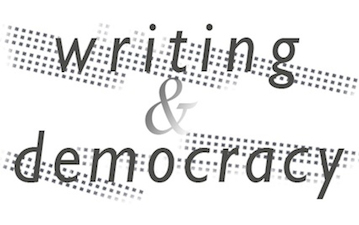Reflection: Catherine Barnett
We were a motley and fragile bunch. One student spoke so quietly we had to keep the windows closed and lean in whenever she spoke. The hurricane had blown through us all. It was our penultimate class and each student had brought in a new poem to revise. As a kind of warm-up to the hands-on work of revision I’d planned for the session, I spontaneously decided to ask the students to try to shout their poems. (I’d just had the pleasure of visiting Craig Teicher’s MFA workshop, where Dottie Lasky had been a guest and had explained why she shouts her poems: “No one could hear me or no one was listening when I read,” she’d said. “I think they were always waiting for the dudes, so I got mad and just started shouting to get people to pay attention.”) I wanted the students to step outside their comfort zones and begin to listen more carefully to their own work and strengths. To counter the resistance, I promised that my wonderful TA, Eli Nadeau, would also give it a try, as would I, though I’ve never in my 15 years of college teaching done such a thing.
One by one the students stood up and walked to the front of the tiny classroom. Gathered themselves. And somehow—I think because of the emotionally challenging nature of the semester and the privilege of having a small but mighty and utterly original group of individuals so radically different from one another, each one unpredictable, iconoclastic, and brilliant—the work took on a whole new and utterly unexpected dimension of yes urgency, but also a counterintuitive gentleness of great emotional force. One student, already accustomed to performing his work in a confident boom, didn’t pause for a moment but read as he usually read, at the end of which I asked him to read his poem over again, at a whisper.
In each case, asking the student to change the delivery of his or her work taught us all about the enlivening tension between text and subtext, the sayable and the unsayable, the ineffable lodged in the wild and the repressed and the suppressed and the silenced. This was just one way—a potent unexpected way—to make real the power of the vast untapped regions in each of our voices both on and off the page.
As promised, I got up and gave it a try. Like one of my students whose music too often boxes him inside, I could not shout. Or, more accurately, I couldn’t inhabit the shout—not yet. I have so long inhabited a poetics and music of understatement that I couldn’t step outside it. This failure was just one of the many gifts given to me by the Riggio students I’ve had the privilege and pleasure of teaching. The risks taken and honored in each Riggio classroom epitomize, for me, one part of the Riggio ethos, risks that are always both political and personal, as it turns out—
Read four poems by Catherine Barnett.
Catherine Barnett is the recipient of a 2012 Academy of American Poets’ James Laughlin Award, a 2006 Guggenheim Fellowship, a 2004 Whiting Writers’ Award, the 2004 Glasgow Prize for Emerging Writers, and a Pushcart Prize. Her book, Into Perfect Spheres Such Holes Are Pierced, won the 2003 Beatrice Hawley Award and was published in spring 2004 by Alice James Books. Her poems have been published in Gulf Coast, Pleiades, the Washington Post, Barrow Street, Shenandoah, The Massachusetts Review, and the Iowa Review. Barnett also teaches at NYU, where she was recently honored with an Outstanding Service Award.



